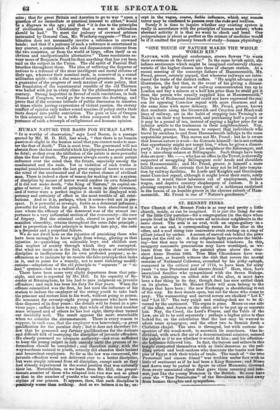HUMAN NATURE THE BASIS FOR HUMAN LAWS. " IT is
worthy of observation," says Lord Bacon, in a passage quoted by Mr. M. D. Hill, last week, " that there is no human passion so slight in the human mind that you cannot make to mas- ter the fear of death." This is most true. The gourmand will not -abstain from the last mouthful which his physician has predicted to be fatal ; so that even the titillation of the palate is more powerful :than the fear of death. The present always exerts a more potent -influence over the mind than the future, especially among the uneducated and the rude. Yet in violation of such truths is .capital punishment made the last great engine of terror to coerce the mind of the uneducated and of the rudest classes of civilized man. There is indeed a show of reason for making it so : a system of discipline by means of terror would confess its own falsehood if it did not make death, "the King of Terrors," its capital en- sine of terror ; for truth of principles is seen in their extremes, and if terror were a perfect engine it should be displayed with .potency and certainty of effect in the most terrible of all retri- butions. And so it is, perhaps, when it comes—but not in pro- spect. It is powerful as revenge, feeble as a deterrent influence; powerful for evil, feeble for good. It has been abandoned in a case where the efficacy of the deterrent was of the utmost im portance to a very influential section of the community—the case of forgery. But the criminal code, cleared in part of its most . manifest absurdity, retains throughout the same false principle ; mid in proportion as that principle is brought into play, the code is a frequent and a perpetual failure. We do not dwell here on the injustice of punishing those who have been untaught to know right from wrong, glaring as that injustice is—punishing on miserable boys and childish men that neglect of society through which they are corrupted. But what we insist on is the fact, that the system of retributive discipline is inefficacious for its own professed purpose ; so in- efficacious as to indicate by its results the false principle that lurks in it, and to point for a remedy, not to mere tinkering modifi- cations—adaptations of the old principle to " separate or " si- lent " systems—but to a radical change. There have been some very slight departures from that prm ciple, and one is reported by Mr. Hill. In his capacity of Re- corder at Birmingham, he has had to pass judgment on juvenile offenders; and such has been his duty for four years. When the offence committed was the first, he has used the influence of his station to induce the employer of the erring youth to take back . the prisoner and restore him to his work, without going to prison. He accounts for seventy-eight young prisoners who have been thus disposed of in four years : the details will be found in a pre-
vious page ; suffice it here to say, that while of that total number some relapsed and of others he has lost sight, thirty-four turned out decidedly well. The result appears the more remarkable , when we consider the circumstances. There is every reason to suppose, in each case, that the employer was benevolent,—a great qualification for the peculiar duty ; but it does not therefore fol-
low that he possessed any further qualifications for the delicate -.and difficult talk of managing the discipline of juvenile offenders.
-.. He clearly possessed no adequate authority—not even sufficient
to keep the young culprit in safe custody until the process of re- formation should be completed ; and therefore many, with the waywardness natural to youth, actually, did abandon their lenient
and benevolent employers. So far as the law was concerned, the juvenile offenders were not delivered over to a better discipline, but were simply released from all discipline, except such as they - had already experienced in the social position that was naturally • their lot. Nevertheless, as we learn from Mr. Hill, the propor- - tionate number of those who relapsed into vice was not so great as that in the number of youths who undergo the ordinary dis-
cipline of our prisons. It appears, then, that such discipline is - positively worse than nothing. And so we believe it to be ; ex-
cept in the vague, coarse, feeble influence, which any remote terror may be confessed to possess over the rude and reckless. Surely it is time to inquire whether any existing system is really in accordance with the principles of human nature; whose aberrant activity it is that we want to check and bend. Our jurisprudence is about as perfect as the science of medicine would be if it omitted the primary branch of study—human physiology.


























 Previous page
Previous page